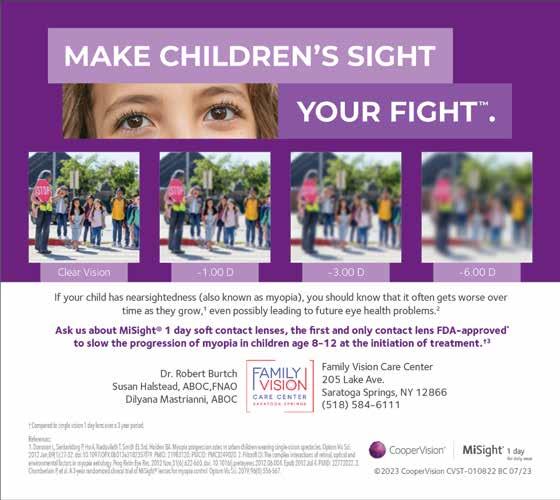
1 minute read
Back to School: Why an Eye Exam?
exam can identify and address any visual impairments that may be hindering a child’s ability to perform well in school.
Eye health assessment: Eye exams also check for general eye health issues, including eye diseases like amblyopia (lazy eye), strabismus (crossed eyes), and more severe conditions like cataracts or glaucoma. Detecting and treating these conditions early can prevent long-term complications and vision loss.
by Susan Halstead, ABOC, FNAO for Saratoga TODAY
Early detection of vision problems: Regular eye exams for children are essential because they help detect vision issues early on. Many eye conditions and refractive errors (such as nearsightedness, farsightedness, and astigmatism) develop during childhood. Identifying these problems early allows for prompt treatment, which can significantly improve a child’s visual development and overall eye health.
Academic performance and learning: Good vision is crucial for a child’s academic success. 80% of learning occurs at near range. Undiagnosed vision problems can lead to difficulties in reading, writing, and learning in general. An eye
Binocular vision assessment: An eye exam evaluates how well a child’s eyes work together as a team (binocular vision). Problems with eye coordination can lead to issues like double vision or poor depth perception, affecting a child’s ability to participate in sports and other activities.
Digital device use: With the increasing use of digital devices (smartphones, tablets, computers), kids are exposed to screens more than ever. Regular eye exams can address issues related to digital eye strain, focusing problems and potential long-term effects on eye health.

Developmental monitoring: Eye exams are part of routine developmental checks for children. They help identify any vision-related developmental delays or abnormalities, ensuring that the child receives appropriate care and intervention if necessary.
Prescription updates: If a child already wears glasses or contact lenses, regular eye exams are vital for updating prescriptions. As a child grows, their vision may change, and regular adjustments to corrective lenses are necessary for optimal visual performance. Typically vision changes accompany growth spurts.

Point of fact: Regular eye exams for kids are critical for detecting and addressing vision problems, promoting healthy eye development, ensuring academic success, and preventing long-term complications related to eye health. The National Institute of Health recommends that children have their first comprehensive eye exam around the age of 6 months, followed by subsequent exams at age 3, and then before starting school. After that, annual eye exams are generally recommended, but the frequency may vary depending on individual needs and any existing vision issues.
Susan Halstead is a Nationally and NYS Licensed Optician and Owner of Family Vision Care Center at 205 Lake Avenue in Saratoga Springs. Susan can be reached at Susan@ familyvisioncarecenter.com






